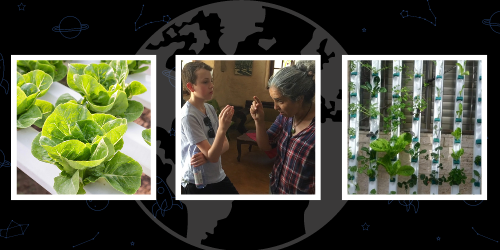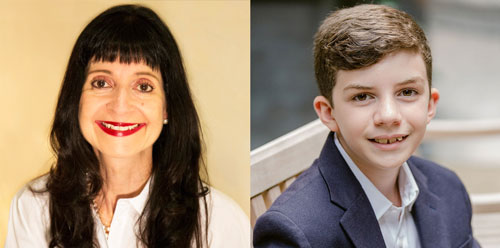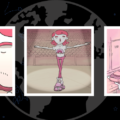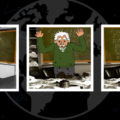This month, audiences can screen Growing Peace in the Middle East on the Planet Classroom Network. This film is curated by the KIDS FIRST! Film Festival for the Planet Classroom Network.
Growing Peace in the Middle East is a film by Director Steven Hoffen, a 7th grader from New York. The award-winning documentary focuses on Sindyanna of Galilee, a farm in Israel where Arab and Jewish women work together closely, cultivating social change as they grow produce in hydroponic gardens. The film documents the non-profit’s efforts, demonstrating the meaningful, ongoing collaboration between Palestinian and Israeli women despite their cultural differences.
The Global Search for Education is pleased to welcome Steven Hoffen.
Steven, welcome. To what degree was this story planned out? Did you stumble upon the Sindyanna of Galilee organization while in Israel, or had you been in contact with them previously?
I went to Israel with my family in the summer of 2019, and we decided to visit the Sindyanna of Galilee after hearing about their excellent work. The staff consists of Arab and Jewish women who share a vision of peaceful coexistence and work towards this goal side by side. We took a tour with the founders, and I was very inspired to see what they were doing.
At the time, I did not think of making a film; it was when I returned to New York, and COVID hit, that I decided to make Growing Peace in the Middle East. The documentary allowed me to be involved and make a difference in Sindyanna despite the distance. I also admire Sindyanna’s approach to creating Arab-Jewish collaboration, and I feel it can be replicated worldwide.
I am interested in filmmaking and human rights. I had a conversation with the Director of Sindyanna, Yoav Tamir, who explained that the unemployment of Arab women in Israel is due to factories closing and moving. This relates to human rights because a fundamental human right is the “right to work” and “free choice of employment.” In Israel, although many jobs are available, Arab women don’t truly have the opportunity to work since most jobs require more education, education that they did not receive in their childhood.
I made the film during the height of the pandemic. All the interviews were done via Zoom, and then I worked on images and details through editing on iMovie and Final Cut Pro. It was challenging, but I was very excited to do this project since it allowed me to explore filmmaking to raise awareness and help others through my work.
The film is now one part of my overall mission for Growing Peace Inc., the non-profit I founded in 2022. Since my trip to Sindyanna, I’ve been involved with various projects, fundraisers, and initiatives. Growing Peace Inc. aims to extend humanitarian efforts and bring hydroponics to schools, food pantries, and other organizations that help those in need.
If you had the chance to make a follow-up visit, what progress would you have expected them to make?
I keep in touch with the team at Sindyanna of Galilee, and their progress is impressive. The non-profit is female-led and promotes the concepts of “business for peace” and Fair Trade in Israel, and they have a variety of programs in place.
The hydroponics gardening program is in full swing, and the Arab and Israeli women are growing a variety of organic produce. Because of the film’s impact, 20 more women have joined Sindyanna’s hydroponics project over the past year. In addition, Sindyanna is introducing hydroponics at the Masar Alternate School, the first experimental alternate Arab/Palestinian school in Israel.
Do you believe projects like this could be viable for solving peace amongst conflicting groups regardless of who they are?
I not only think projects like these are viable, but I also know they are! I have seen this for myself at Sindyanna. The hydroponics project brought together Israeli and Arab women, who have historically been in conflict. They work together side by side and in unity to alleviate food insecurity and hunger and create food equality and justice.
Having seen the success, I wanted to bring this type of system to other groups in need. I raised funds to install a similar hydroponics system at the Mesila Lasova food pantry in Tel Aviv, Israel, which isn’t like any other ordinary food bank. It opened at the beginning of COVID, and its primary goal is to provide food for asylum seekers, particularly those fleeing from places such as Eritrea and Sudan. They don’t have access to much help from the government because they are not citizens.
I am also doing similar type projects in areas of New York City, where people from underserved communities suffer from poverty and food insecurity. Creating a hydroponics gardening system gives them access to fresh produce, allows them to profit physically and financially, and helps them gain self-confidence as they contribute positively to the community.
What do you envision in the future for sustainable gardening and hydroponics?
I’m very involved with hydroponic farming, which grows crops directly in nutrient-rich water. I hope that hydroponic farming will continue to grow in popularity and use. There are so many advantages to growing produce this way. Not only are hydroponic vegetables indistinguishable from those conventionally grown, but they also offer several advantages, such as being healthier and tastier than traditionally grown crops. Additionally, the way that hydroponics operates has incredible benefits for the environment, such as consuming less water, no soil, and taking up much less space.
Additionally, gardening provides an abundance of healthy fresh food that is especially important in communities that lack local grocery stores or access to fresh produce. Hydroponic gardening can help create food equality and justice and brings communities together, connecting neighbors and creating green spaces. It can help people save money on groceries, and it’s great to know that the food they eat is not grown with harmful pesticides.
Thank you Steven!
C.M. Rubin and Steven Hoffen
Don’t Miss Growing Peace in the Middle East, now screening on the Planet Classroom Network. This film is curated by the KIDS FIRST! Film Festival for the Planet Classroom Network.







Recent Comments